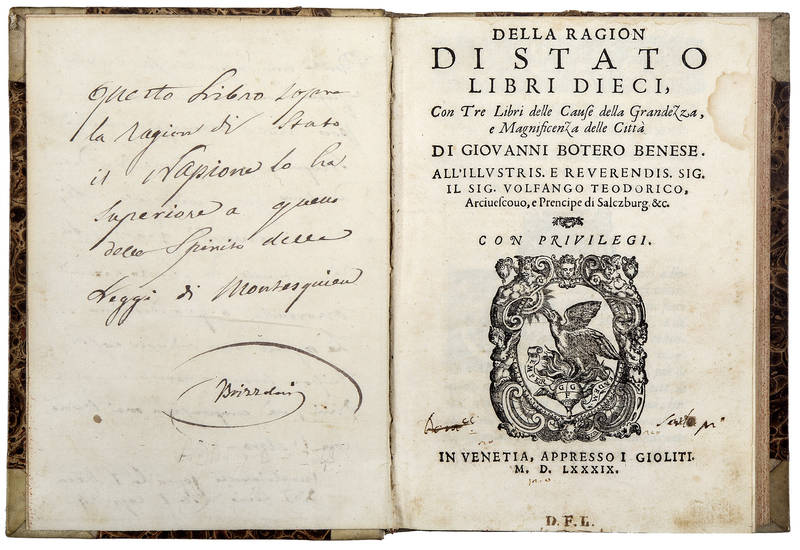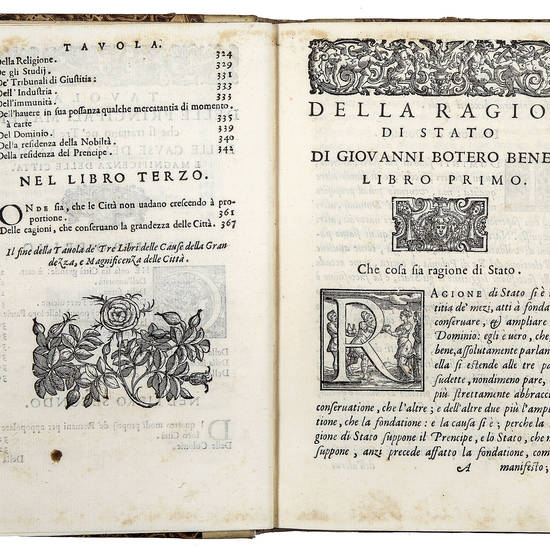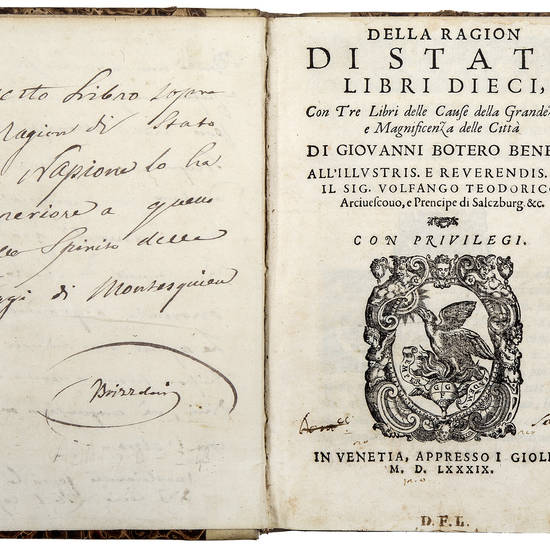“A path-breaking performance” (schumpeter)
4to (205x142 mm). [16], 367, [1] pp. Collation: *8 A-Z8. Printer's device on title page, typographic ornament on last leaf verso. 19th-century half vellum, richly gilt spine with lettering piece, sprinkled edges. On the front flyleaf two long 19th-century manuscript notes containing a quote from Machiavelli and a reference to Galeani Napione; on the title page a partially erased ownership entry and the initials “D.F.L.”; on the last flyealf the purchase note “acquistato all'auzione pubb. in Roma il di 15 genn. 1842 a pau. 2”. Some staining and foxing, wormholes to the last three leaves not affecting text, a good copy.
FIRST COLLECTED EDITION, dedicated to the Prince Bishop of Salzburg Wolf Dietrich von Ratenau, of the most influential Italian political treatise after Machiavelli's Principe.
The first edition of the Ragion di stato was issued by Giolito earlier that same year. This new edition was the first to include the ‘Three Books on the Causes of the Greatness and Magnificence of Cities' (Tre libri delle cause della grandezza, e magnificenza delle città), which had been published seperately in Rome in 1588. In this small but fundamental work, Botero elaborates a scientific theory on topographic dislocation and the growth of urban agglomerations, identifying a precise relationship between natural environment, economic resources, and demographic development.
“Divested of nonessentials, the ‘Malthusian' Principle of Population sprang fully developed from the brain of Botero in 1589: populations tend to increase, beyond any assignable limit, to the full extent made possible by human fecundity (the virtus generativa of the Latin translation); the means of subsistence, on the contrary, and the possibilities of increasing them (the virtus nutritiva) are definitely limited and therefore impose a limit on that increase, the only one there is; this limit asserts itself through want, which will induce people to refrain from marrying (Malthus's negative check, prudential check, ‘moral restraint') unless numbers are periodically reduced by wars, pestilence, and so on (Malthus's positive check). This path-breaking performance – the only performance in the whole history of the theory of population to deserve any credit at all – came much before the time in which its message could have spread: it was practically lost in the populationist wave of the seventeenth century. But about two hundred years after Botero, Malthus really did no more than repeat it, except that he adopted particular mathematical laws for the operation of the virtus generativa and the virtus nutritiva: population was to increase ‘in geometric ratio or progression'” (Schumpeter, History of Economic Analysis, pp. 254-255).
Though Botero officially opposed Machiavelli, the latter had strongly influenced him. Following in Botero's footsteps, most 17th-century theoreticians of the ‘Reason of State' shared the same ambivalent attitude towards Machiavelli. On the one side they theoretically rejected his doctrines as contrary to morality and religion; on the other side they actually accepted them into the system of government (cf. A. Panella, Gli antimachiavellici, Florence, 1943, p. 63).
The success of the Ragion di stato, however, was not only due to this doctrinal re-elaboration of Machiavellism, but also to the vast and systematic exposition it contains of all major issues that accompany the development of a modern state: tax, military organization, commerce, industry, judicial administration, urban planning. Better than any other work of its time, Botero's book analyses the transition from a feudal state to the new bureaucratic one.
Edit 16, CNCE7272; Adams, B-2548; Gamba, no. 1271; Goldsmiths, no. 248; Kress, no. 178; Bongi, II, pp. 432-433; T. Bozza, Scrittori politici italiani, Rome, 1949, pp. 66-68, no. 34; G. Botero, Della Ragion di stato, P. Benedittini & R. Descendre, eds., Turin, 2016.
[7162]





